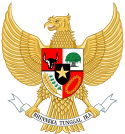
Netherlands New Guinea refers to the Papua region of Indonesia while it was an overseas territory of the Kingdom of the Netherlands from 1949 to 1962. Until 1949 it was a part of the Dutch East Indies. It was commonly known as Dutch New Guinea. It contained what are now Indonesia's two easternmost provinces, Papua and West Papua, which were administered as a single province prior to 2003 under the name Irian Jaya.
Budi Utomo, meaning "Prime Philosophy", was the first native political society in the Dutch East Indies. The political society is considered instrumental on the beginning of the Indonesian National Awakening.

The Catholic Church in Indonesia is part of the worldwide Catholic Church, under the spiritual leadership of the pope in Rome. Catholicism is one of the six approved religions in Indonesia, the others being Islam, Protestantism, Hinduism, Buddhism, and Confucianism. According to official figures, Catholics made up 2.9% percent of the population in 2010. The number of the Catholics is therefore nearly 7.5 million. Indonesia is primarily Muslim, but Catholicism is the dominant faith in certain areas of the country.
The Indonesian National Awakening is a term for the period in the first half of the 20th century, during which people from many parts of the archipelago of Indonesia first began to develop a national consciousness as "Indonesians".

Ernest François Eugène Douwes Dekker also known as Setyabudi or Setiabudi was an Indonesian-Dutch nationalist and politician of Indo descent. He was related to the famous Dutch anti-colonialism writer Multatuli, whose real name was Eduard Douwes Dekker. In his youth, he fought in the Second Boer War in South Africa on the Boer side. His thoughts were highly influential in the early years of the Indonesian freedom movement.
Frans Hendrik Karel Zaalberg was an Indo (Eurasian) journalist and politician in the Dutch East Indies.

Frederik Hermanus "Dick" de Hoog was the Indo (Eurasian) President of the Indo European Alliance, member of People’s Council and professional politician in the Dutch East Indies. He was also a Grand Master (Masonic) of the Dutch East Indies Freemasonry.
Pieter Frederich Dahler, more commonly known as P.F. Dahler or Frits Dahler, was one of the leading Indo (Eurasian) politicians and activists advocating integration of the native Indo-European community into the indigenous society of the Dutch East Indies. After World War II he changed his name to Amir Dachlan.
Insulinde (1907–1919), a direct successor of the Indische Party (IP) and later renamed the Nationale Indische Party (NIP), was a political organization that represented efforts by some Indo Eurasians to identify and cooperate with the Indigenous educated élite of the Dutch East Indies in an effort to establish an independent dominion. The organisation was mainly led by Indo-European and Javanese activists, but had a considerable membership in the South Moluccas. It was considered part of the more radical political wing in the colony, for which it faced much oppression from the colonial authorities.

Elections to the Volksraad were held in the Dutch East Indies in 1921. The result was a victory for the Political Economic Union.

Elections to the Volksraad were held in the Dutch East Indies in 1924.

Elections to the Volksraad were held in the Dutch East Indies in 1927.

Elections to the Volksraad were held in the Dutch East Indies in 1931.

The Governor-General of the Dutch East Indies represented Dutch rule in the Dutch East Indies between 1610 and Dutch recognition of the independence of Indonesia in 1949.
Mohammad Husni Thamrin was an Indonesian political thinker and National Hero.
The Indo people or Indos are Eurasian people living in or connected with Indonesia. In its narrowest sense, the term refers to people in the former Dutch East Indies who held European legal status but who were of mixed descent, that are descendants of various indigenous peoples of Indonesia and Dutch settlers. In the broadest sense, an Indo is anyone of mixed European and Indonesian descent. Indos are associated with colonial culture of the former Dutch East Indies, a Dutch colony in Southeast Asia and a predecessor to modern Indonesia after its proclamation of independence shortly after World War II. The term was used to describe people acknowledged to be of mixed Dutch and Indonesian descent, or it was a term used in the Dutch East Indies to apply to Europeans who had partial Asian ancestry. The European ancestry of these people was predominantly Dutch, but also included Portuguese, British, French, Belgian, German, and others.
Phoa Liong Gie Sia was an Indonesian-born Swiss jurist, politician and newspaper owner of the late colonial era in the Dutch East Indies.

Elections to the Volksraad were held in the Dutch East Indies in 1935.








